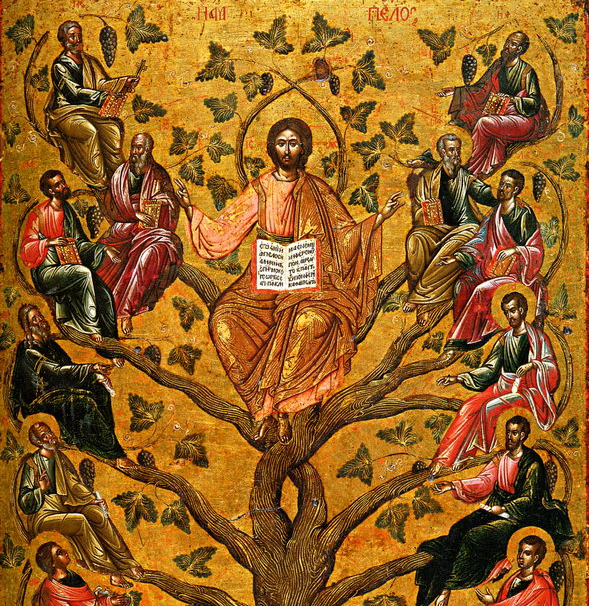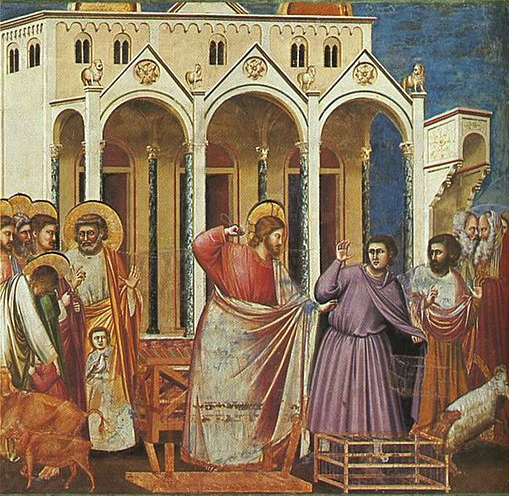Christian Art | Baptism
King James Audio Bible
What Is Baptism? | How Does Baptism Relate To Christian Faith? | Jesus Was Baptized
Baptism is a sacrament in Christianity that marks the beginning of a person’s journey of faith. It is a rite of initiation that symbolizes the cleansing of original sin and the granting of the gift of the Holy Spirit.
‘Baptism is the basis of the whole Christian life, the gateway to life in the Spirit and the door which gives access to the other sacraments. Through Baptism we are freed from sin and reborn as sons of God; we become members of Christ, are incorporated into the Church and made sharers in her mission: Baptism is the sacrament of regeneration through water in the word.’
The act of baptism can be performed by anybody, who pours water over the head of the person being baptized, while speaking the words: ‘I baptize you in the name of the Father, and of the Son, and of the Holy Spirit.’
The water symbolizes the washing away of sin and the granting of new life in Christ. In the words of Saint Augustine: ‘Baptism is a bath of new birth, which is given once and for all, so that what was born of the flesh may die and what was born of the Spirit may live.’
Baptism is not only a one-time event but it is also a lifelong commitment.
The Catechism states: ‘Baptism seals the Christian with the indelible spiritual mark (character) of his belonging to Christ. No sin can erase this mark, even if sin prevents Baptism from bearing the fruits of salvation. Given once for all, Baptism cannot be repeated.’
This means that once a person is baptized, they are forever marked as a child of God and are called to live a life in accordance with the teachings of Jesus Christ.

Christian Baptism And The Community Of Faith
One of the key aspects of baptism is that it initiates us into the community of faith. ‘Baptism is the sacrament of faith. But faith needs the community of believers. It is only within the faith of the Church that each of the faithful can believe. The faith required for Baptism is not a perfect and mature faith, but a beginning that is called to develop.’ This means that through baptism, we become members of the body of Christ, the Church, and are called to grow in our faith through the support and guidance of the community of believers.
In addition, baptism also calls us to lead a life of service and mission.
‘Baptism is the sacrament of faith. But faith needs the community of believers. It is only within the faith of the Church that each of the faithful can believe. The faith required for Baptism is not a perfect and mature faith, but a beginning that is called to develop.’ This means that through baptism, we are called to share the love and message of Jesus Christ with others and to serve those in need.
What Historical Evidence Is There As To The Origin Of Baptism In Christian Communities?
The origins of baptism in Christian communities can be traced back to the early days of Christianity. The practice of baptism is rooted in the teachings and actions of Jesus Christ, as well as in the writings of the early Christian Church fathers.
The New Testament accounts of Jesus’ life, such as the Gospels of Matthew, Mark, Luke and John, describe Jesus’ own baptism by John the Baptist and his instruction to his disciples to baptize others. In Matthew 28:19, Jesus says to his disciples, ‘Therefore go and make disciples of all nations, baptizing them in the name of the Father and of the Son and of the Holy Spirit.’ This passage is often referred to as the Great Commission, and it is understood as Jesus’ instruction to his followers to baptize others in the same way that he himself had been baptized.
The earliest Christian communities, as recorded in the New Testament, also practiced baptism as a rite of initiation. The book of Acts, for example, describes the conversion and baptism of individuals such as the Ethiopian eunuch (Acts 8:26-39) and the apostle Paul (Acts 9:18). The letters of the Apostle Paul, such as Romans and Colossians, also refer to baptism as an essential part of the Christian faith.
The writings of the early Church fathers also provide insight into the origins of baptism in Christian communities.
Justin Martyr, an early Christian apologist who lived in the 2nd century, wrote about the practice of baptism in his First Apology, stating that ‘as many as are persuaded and believe that what we teach and say is true, and undertake to be able to live accordingly, are instructed to pray and to entreat God with fasting, for the remission of their sins that are past, we praying and fasting with them. Then they are brought by us where there is water, and are regenerated in the same manner in which we were ourselves regenerated.’
Baptism in early Christianity was seen as a rite of initiation, a way of becoming a member of the Christian community. It was also seen as a sacrament that was necessary for the forgiveness of sins and the granting of the gift of the Holy Spirit. The historical evidence from the New Testament and the writings of the early Church fathers suggests that the practice of baptism has been an integral part of Christian communities since the very beginning of Christianity.
It’s worth noting that some Christian denominations have different views on the origins of baptism. Some Anabaptist groups like the Mennonites do not believe in infant baptism and only practise believer’s baptism.
What Have Religious Leaders Said About Jesus’ Baptism By John The Baptist?
Jesus’ baptism by John the Baptist is a significant event in the New Testament and has been the subject of much discussion and interpretation by religious leaders throughout history.
Religious leaders have emphasized the importance of Jesus’ baptism as a moment of revelation and confirmation of his identity as the Son of God. The Catechism states: ‘Jesus’ baptism is on his part the acceptance and inauguration of his mission as God’s suffering Servant. He allows himself to be numbered among sinners; he is already ‘the Lamb of God, who takes away the sin of the world.’ (CCC 536)
Some religious leaders have emphasized the role of John the Baptist in Jesus’ baptism as a symbol of his role as a precursor to Jesus.
The Catholic Church has traditionally seen John the Baptist as the last prophet of the Old Testament and the forerunner of Jesus Christ. Pope Francis has stated: ‘John the Baptist is the voice of one crying out in the wilderness, the voice of the prophet who prepares the way of the Lord. He is the voice of one who announces the coming of the Messiah and points him out to the people.’
Religious leaders have pointed to Jesus’ baptism as a moment of humility and solidarity with humanity. For example, Dr. Martin Luther King Jr. said, ‘Jesus’ baptism was an act of identification. He identified himself with the people. He went down into the water identifying himself with the humanity that was beneath the water.’
Religious leaders have also seen Jesus’ baptism as a moment of divine revelation, where the voice of God is heard from heaven. For example, the Bible speaks of a voice from heaven saying: ‘You are my Son, whom I love; with you I am well pleased.’ This has been interpreted as the voice of God the Father affirming Jesus as his son, and also as the Holy Spirit descending upon Jesus in the form of a dove.
Jesus’ baptism by John the Baptist has been seen as a moment of revelation and confirmation of Jesus’ identity as the Son of God, a symbol of John the Baptist’s role as a precursor to Jesus, a moment of humility and solidarity with humanity, and a moment of divine revelation.
Does The Baptist Church Have A Unique Approach To Baptism?
The Baptist Church, like many other Christian denominations, believes in the practice of baptism as a sacrament and an important step in the journey of faith. However, the Baptist Church does have some unique approaches and beliefs regarding baptism that differentiate it from other denominations.
One of the main unique approaches of the Baptist Church is its belief in ‘believer’s baptism.’ This means that baptism is only given to individuals who have made a personal confession of faith in Jesus Christ, as opposed to infant baptism. This belief is based on the idea that baptism is an outward expression of an inward commitment to faith, and therefore should only be given to those who have made that commitment. The Baptist Church also practices baptism by immersion, where the individual is fully submerged in water, as a symbol of the death and resurrection of Jesus Christ and the believer’s new life in Him.
In the Baptist Church, baptism is considered a sacrament and an important step in the spiritual journey of a believer. It is seen as an act of obedience to Jesus’ command in the Great Commission to ‘go and make disciples of all nations, baptizing them in the name of the Father and of the Son and of the Holy Spirit’ (Matthew 28:19). In addition, baptism is also seen as an opportunity for believers to publicly profess their faith and be welcomed into the community of believers.
The Baptist Church also believes that baptism is necessary for salvation. They believe that baptism is not only a symbol of faith but also a means of grace, through which God imparts His saving grace to the believer. This is supported by the idea that Jesus commanded his followers to be baptized in the name of the Father, the Son, and the Holy Spirit and that those who believe and are baptized will be saved.
In conclusion, The Baptist Church has a unique approach to baptism, by emphasizing the believer’s confession of faith in Jesus Christ and baptism by immersion. It is considered a sacrament and an important step in the spiritual journey of a believer; it is an act of obedience to Jesus’ command and also a means of grace through which God imparts his saving grace to the believer.
How Does The Church Of Jesus Christ Of Latter Day Saints Approach Baptism?
The Church of Jesus Christ of Latter-day Saints, also known as the Mormon Church, approaches baptism in a unique way compared to other Christian denominations.
One of the main unique aspects of Mormon baptism is that it is typically performed at age 8, which is considered the ‘age of accountability’ when a child is able to understand and make personal decisions about their faith. This is based on the belief that children are innocent before God and therefore do not need to be baptized until they reach an age where they can understand and choose for themselves.
Another unique aspect of Mormon baptism is that it is performed by immersion by authorized priesthood holders. The person being baptized must also make a public declaration of their faith in Jesus Christ and their commitment to follow His teachings. The person performing the baptism must pronounce the appropriate words in the name of the Father, the Son, and the Holy Ghost.
Mormon baptism is also considered a necessary step in the process of salvation and exaltation. It is seen as the first step in receiving the gift of the Holy Ghost and becoming a member of the Church. Additionally, baptism is also seen as a means of washing away one’s sins and starting anew, becoming a new creation in Christ.
In the Doctrine and Covenants of the Church, it is written: ‘Baptism is to be found in the Church of Jesus Christ of Latter-day Saints, and is the first step in entering into the Kingdom of God.’
In conclusion, The Church of Jesus Christ of Latter-day Saints approaches baptism as a sacrament that is typically performed at age 8, performed by immersion by authorized priesthood holders, and it is considered a necessary step in the process of salvation and exaltation, it is seen as a means of washing away one’s sins and starting anew, becoming a new creation in Christ.
What Is The Role Of Godparents At Baptism?
In Christian denominations that practise infant baptism, such as the Roman Catholic Church, Eastern Orthodox Church and Anglican Church, godparents play an important role in the baptism ceremony and in the spiritual upbringing of the child.
Godparents, also known as sponsors, are chosen by the parents of the child being baptized to serve as spiritual guides and role models for the child in their faith journey. They are typically chosen from among the child’s close family members or friends who are practising members of the same denomination.
During the baptism ceremony, the godparents will typically stand with the parents and the child at the font and make a public profession of faith on behalf of the child. They will also answer questions from the priest or minister on behalf of the child, such as renouncing Satan and professing faith in Jesus Christ. In some denominations, godparents will also make a promise to help the child to be brought up in the faith.
After the baptism ceremony, the godparents are expected to take an active role in the child’s spiritual development. This may involve regular visits, attending church together, and providing guidance and support in the child’s faith journey.
Godparents are also seen as important spiritual guides and role models for the child, they are expected to guide, teach and support the child’s spiritual life, in some cases, If the parents are unable to fulfil their role for any reason, the godparents are expected to step in and fulfil their obligations.
When And How Do We Renew Our Baptismal Promises?
For many Christians, the renewal of baptismal promises is typically done during the sacrament of Confirmation or Chrismation, which is often celebrated during adolescence or adulthood. During this sacrament, the individual reaffirms the promises made on their behalf at their baptism and confirms their own personal commitment to their faith.
The specific form of the renewal of baptismal promises can vary among different denominations. In the Roman Catholic Church, for example, the individual will renew their baptismal promises during the Confirmation ceremony by answering a series of questions, such as ‘Do you reject Satan?’ and ‘Do you believe in God, the Father almighty, creator of heaven and earth?’
In the Anglican Church, the renewal of baptismal promises is done during Confirmation, where the bishop will ask the confirmand to reaffirm their faith in the Trinity and to reject Satan and all his works.
In the Eastern Orthodox Church, the renewal of baptismal promises is done during the sacrament of Chrismation, where the individual will reaffirm their faith in the Holy Trinity and in the one baptism for the forgiveness of sins, and will receive the anointing with Holy Chrism, which is a sacrament that strengthens the individual’s faith and helps them to live a more godly life.
In many protestant denominations, Confirmation is not a sacrament and is not considered necessary for salvation, but they still do have a ceremony where the confirmand reaffirm their faith and the promises made at baptism.








